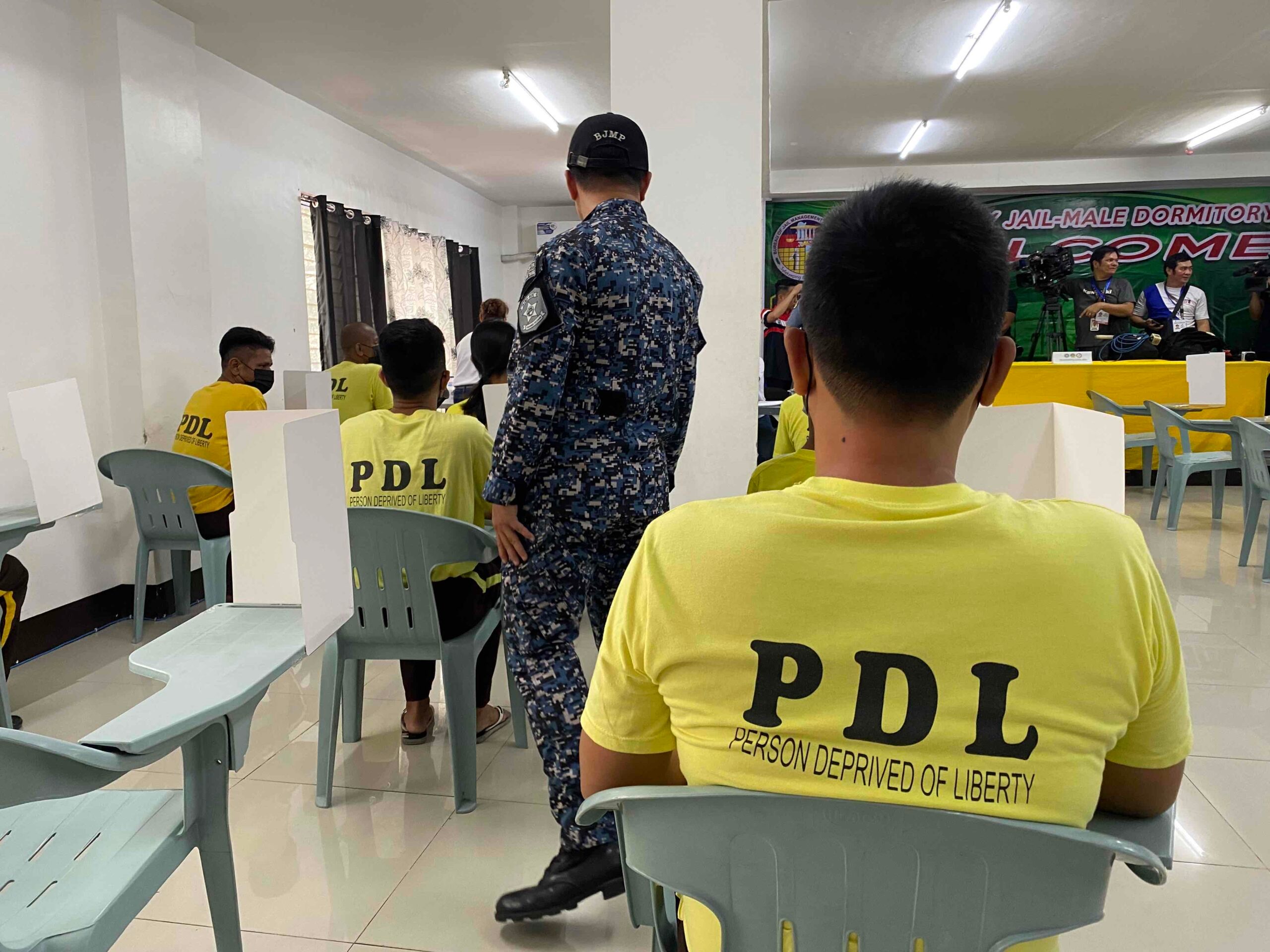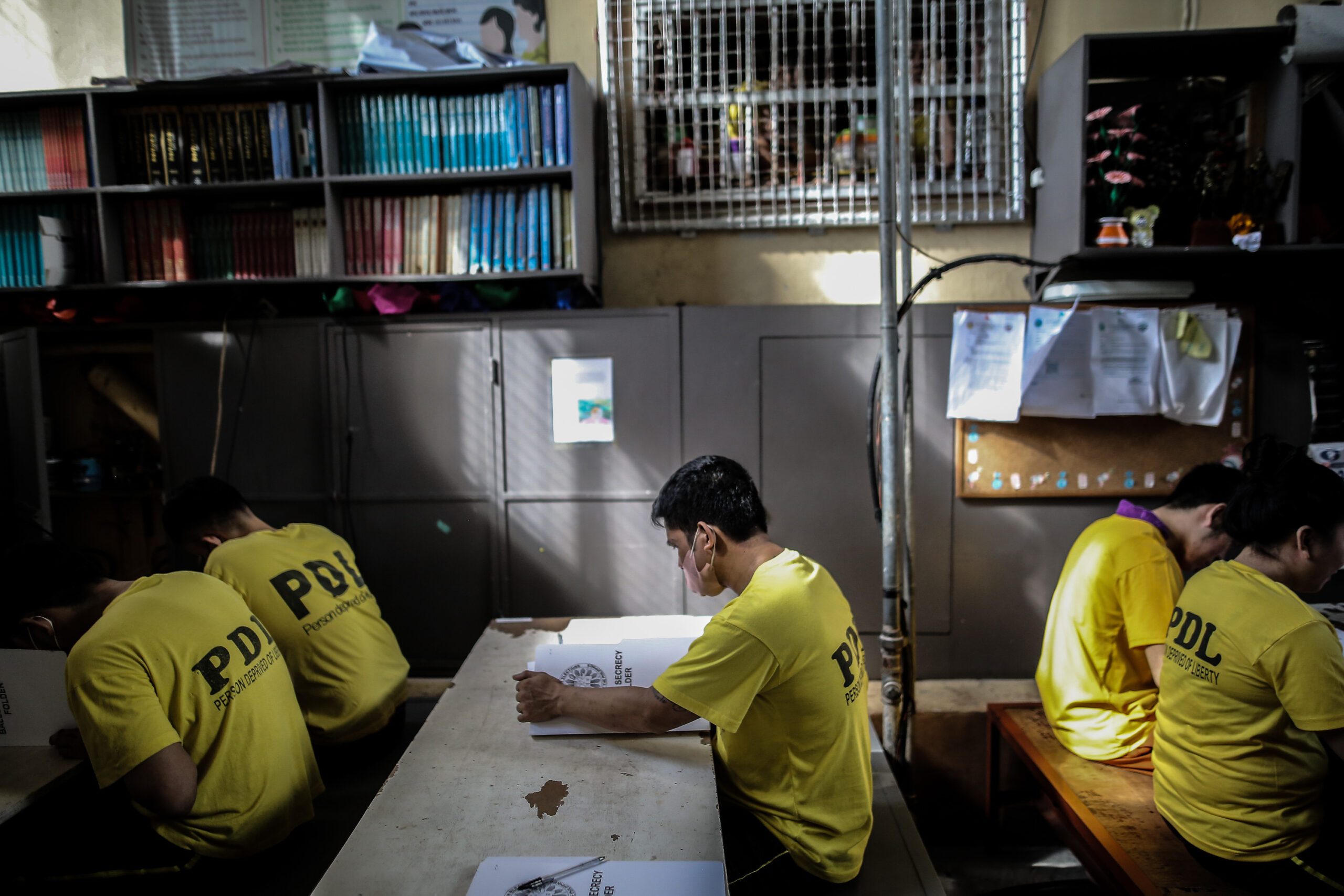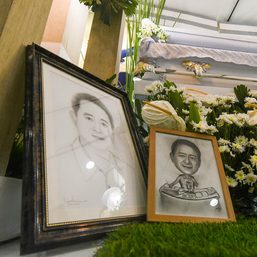SUMMARY
This is AI generated summarization, which may have errors. For context, always refer to the full article.

MANILA, Philippines – An elderly inmate who voted on Monday, October 30, said that when he gets out, he would also want to run in the barangay and Sangguniang Kabataan elections (BSKE) “para maibahagi ko ‘yung kalupitan ng droga (so I can share the cruel consequences of drugs),” he said in Filipino from the male dormitory of the Manila City Jail.
The inmate does not have to wait to be free to run in the BSKE. This year, a total of eight inmates nationwide are running for positions in the villages that cover where they are detained: two for chairman and six for councilor.
This is ten years in the making, as the last time that Persons Deprived of Liberty (PDLs) were allowed to vote in the local elections was in 2013 when 6,748 prisoners voted. This year, a record 29,171 PDLs can vote nationwide.
Detainees missed the other elections in between because someone had petitioned against the Commission on Elections (Comelec) resolution allowing them to vote. In 2016, the Supreme Court issued a temporary restraining order (TRO) against the resolution and lifted it only last year.
The Constitution says all citizens must be able to vote, unless disqualified by law. The law in question, the Omnibus Election Code, only disqualifies those who have final judgments in crimes with sentences of more than one year, or crimes involving disloyalty to the government.
But Comelec resolution 9371, from 2012 and affirmed by the High Court in 2022, now even allows those convicted of crimes involving disloyalty to the government if their conviction is on appeal.
Rights of PDLs
Barangays officials are the first point of contact when detainees encounter a problem, whether it is shortage of water, food and – as the elderly inmate said – hygiene kits.
“Sila ba ay nakakatulog ng tama, nakakain ng tama, sila ba ay napapaarawan, ang kanilang kalusugan ba ay naaalagaan, these basic things, lalong lalo na ang karapatang pantao,” said Interior Secretary Benhur Abalos when he inspected the voting at the Manila City Jail.
(Are they sleeping well, eating well, are they getting enough sun, is their health being taken care of, these basic things, especially their human rights.)
Apart from basic needs, prisons are also plagued by problems of gang violence and mysterious deaths.
But, at least, in the Manila City Jail, candidates did not get to campaign in person. Inmates were only made to watch campaign videos of some and not all of the candidates, or look at their campaign posters inside the detention facility, or rely on the inputs of their friends and relatives who visit them. There was no dialogue between candidates and detainees.
The elderly inmate is among thousands of detainees facing drug charges, which comprise 70% of the total population of pre-trial inmates in the entire country. Penal institutions nationwide reached a peak congestion rate of 600% in 2018 at the height of Rodrigo Duterte’s war on drugs. Congestion rate is now down to 357%, which translates to 35 inmates sharing a cell meant only for 10.
“Our recent data is that close to 30% who get out of prison return to prison, and 70% is supposed to be drugs. Why? Maybe when you go out, you don’t have a home or you don’t have a family, and most importantly you don’t have a job, and your community looks at you a different way,” said Abalos in a mix of Filipino and English when asked what is on the agenda of barangay officials when it comes to detainees’ rights.
Abalos said barangay officials can help with skills assessments and trainings for inmates about to get out, so they can be reintegrated smoothly.

Drug war
The barangay’s role in the abuses in Duterte’s drug war has been questioned before. Pending before the Supreme Court is a six-year-old petition that wants to nullify, among others, the barangay-run crime reporting system that is said to have led to the creation of the infamous drug lists.
A Rappler investigation found that many people who are on the drug list end up dead, leading human rights lawyers to call it a “kill list.” Without a Supreme Court action on these petitions, and no declaration from the Marcos government to rescind these circulars, the drug war on paper is still alive.
President Ferdinand Marcos Jr., however, has since changed the official tenor from Duterte’s kill policy to respect for human rights. Asked whether barangays, which are under the interior department, were briefed to make sure that freed detainees don’t end up on drug lists again or that they will be safe when they go out, Abalos simply said they are focused now on reformation programs.
“We are going around about this, let’s not brand – not because a person has done something doesn’t mean they cannot change. It shouldn’t be that way. As much as possible, the community should embrace them,” said Abalos.
In Marcos’ campaign against drugs, 438 have been killed, 195 of them were killed by state agents, according to data as of October 15 by the Dahas Project.
Voting

The Department of the Interior and Local Government (DILG) and the Bureau of Jail Management and Penology (BJMP) were able to put up 418 special precincts inside jails, meant to accommodate facilities that have more than 50 registered voters. Those facilities with less than 50 voters were allowed to vote with escorts in regular precincts.
Of the 29,171 registered voters, around 6% or 1,600 were able to go out. At the Manila City Jail, 303 voted from inside detention facilities covering several barangays in the city’s third district.
There has been no untoward incident as of this morning, said BJMP chief Ruel Rivera.
“It’s very peaceful, we set up a central command system and we’re glad to announce zero untoward incident for this time. Hopefully, this continues until this afternoon and we will look after this process,” said Rivera in a mix of Filipino and English. – Rappler.com
Add a comment
How does this make you feel?







![[WATCH] Silent Tragedy: Epekto ng war on drugs sa mga bilangguan](https://www.rappler.com/tachyon/2024/06/silent-tragedy-tcard.jpg?resize=257%2C257&crop_strategy=attention)


There are no comments yet. Add your comment to start the conversation.